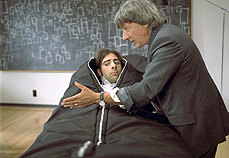![[Deep Focus]](../../flicker/longo.gif)

Existential body bag.
![[Deep Focus]](../../flicker/longo.gif)
|
|
| I ♥ Huckabees
|
|
 |
B- |
|
Existential body bag. |
|
|
Movie Credits: Directed by David O. Russell Written by Jeff Baena and Russell Cinematography by Peter Deming Edited by Robert K. Lambert Starring Jason Schwartzman, Mark Wahlberg, Jude Law and Naomi Watts USA, 2004 Aspect ratio: 1.85:1 Screened 10/1/04 at Loews Lincoln Square, New York, NY Reviewed 10/7/04
|
There’s much to admire in this film’s ambitious, gallumphing rhinoceros of a screenplay; it's the all-over-the-map execution that left me crying for release. It’s a farce, right? Co-writer/director David O. Russell clearly adores farce, but there’s something so desperately earnest about the way that he stages this thing that his screwballs are outmatched by his talking heads — Lily Tomlin and Dustin Hoffman are existential detectives hired by confused young Jason Schwartzman to help him make sense out of his world. (Mark Wahlberg, a fireman so disgusted by the petroleum industry that he rides a bicycle to alarm calls, has his own set of issues and gets paired up with Schwartzman in a kind of buddy system.) They preach the interconnectedness of all things, but Isabelle Huppert — a French nihilist who broke from their teachings! — is lurking around the margins, aiming to school the young Schwartzman in all kinds of ways. Russell did start to win me over with a few archly deployed set pieces, including a tense, hysterically funny encounter between Wahlberg and Schwartzman's characters and an ordinary Christian family — a shrill scene that’s not so much confirmation of the liberal Hollywood conspiracy as it is a showdown gabfest between two movie characters who are questioning everything about their own belief systems while confronting a whole family that evinces a smug certainty about its own — and such breezily deployed excuses for overbroad physical comedy as Tomlin's and Hoffman's hysterically clumsy attempt to zig-zag through a grid of lawn sprinklers. The satire spread like a wallpaper backing for the narrative goings-on is pretty funny, too, with Naomi Watts’s Huckabees ad spots — a bizarrely sexualized variant on the Target/Old Navy/Gap campaigns that carpet-bomb U.S. airwaves — and boyfriend Jude Law’s smarmy company guy — who wraps himself in the trappings of environmentalism to score PR points — as standouts. By the end of the film, though, something weird has happened, and Watts and Law have become primary characters, their worlds disintegrating as they begin to examine critically the lives they had taken for granted. This makes them unhappy. Which is part of the point the film is trying to make — that, underneath the gruff and unflappable exteriors, the beautiful people are just like the rest of us. And we’re all interconnected somehow. I think. Anyway, that psychological theorizing is thrown up on the screen like an albatross round a sailor's neck. It would take a lighter touch to make this kind of college philosophy course work as the coruscating comedy that I ♥ Huckabees sporadically threatens to become. Furthermore, Russell seems pretty serious about the film’s ultimate message, which I think has something to do with examining your life and feeling your connections with others — but not getting too bummed out about it. Fair enough. But it’s laid on a little thick. Huckabees has already been compared to those eccentrically self-aware Charlie Kaufman films; I think it bears some resemblance both visually and thematically to Fight Club, which is, similarly, a comedy with real ideas about important issues of contemporary living that uses a variety of visualizations to bring them to life. Where Huckabees features a character who consciously repudiates the Beauty Myth, Fight Club is predicated on its own protagonist's angry embrace of a myth about the loss of manliness among contemporary men. And Huckabees’ indignant satire on escaping the grasp of a soulless corporation is far less cynical than Fight Club’s take on the situation, which is that perhaps the corporations have already won — and, if they haven’t, only acts of terrorism will be able to bring them down anyway, which is quite something for an alienated generation to chew on. By contrast, Huckabees is sunshine and light; it pretends to have answers to the big questions, but the solutions are deliberate and precious and convenient; they don’t earn the emotional connections they demand. It may be that Russell has allowed what should be the story’s subtext to become its pretext. Instead of demonstrating and advocating for these particular ideas through narrative, Huckabees is explicitly and primarily about the ideas themselves, and that just turns out to be a little too mannered an approach to The Big Questions for my own taste. Your mileage, even more than usual, may vary.
|
 http://www.deep-focus.com/dfweblog/
bryant@deep-focus.com
http://www.deep-focus.com/dfweblog/
bryant@deep-focus.com